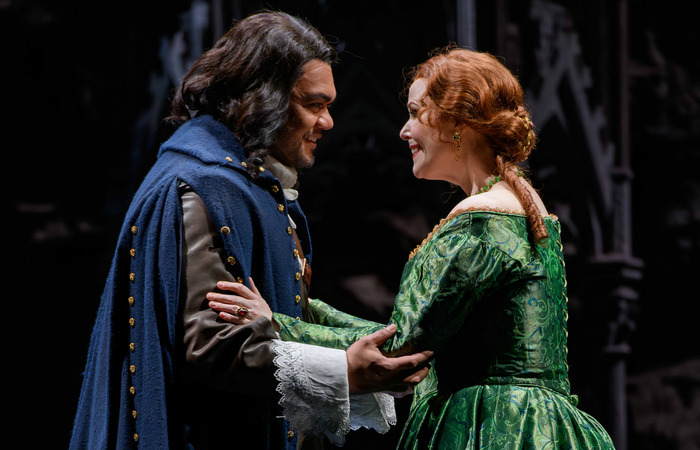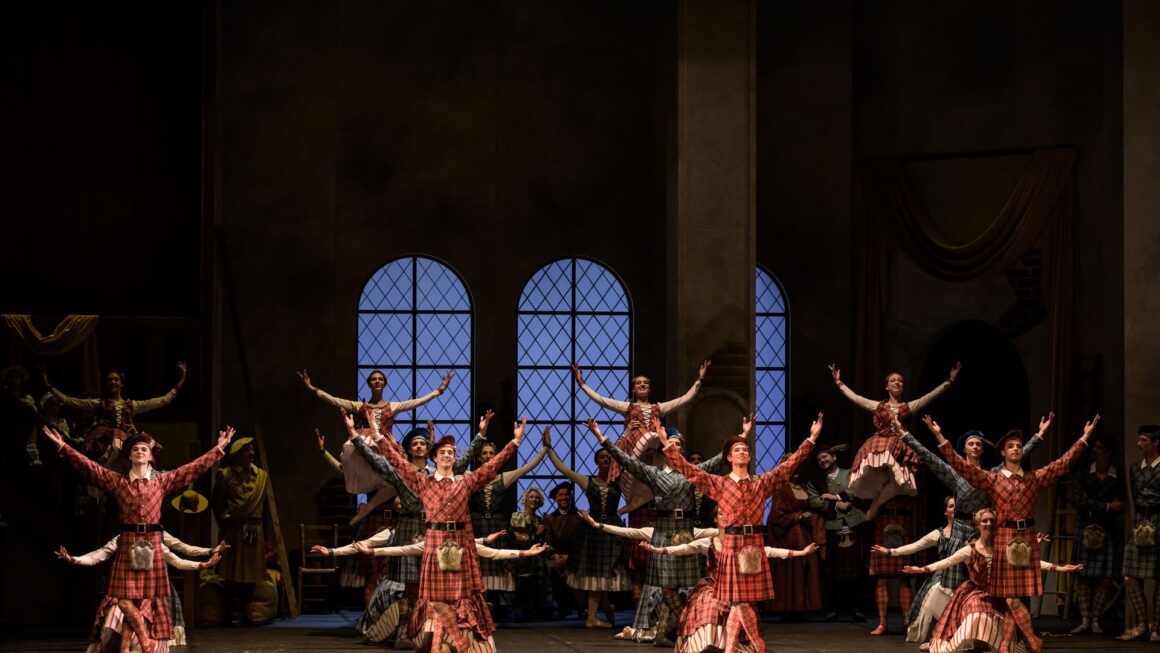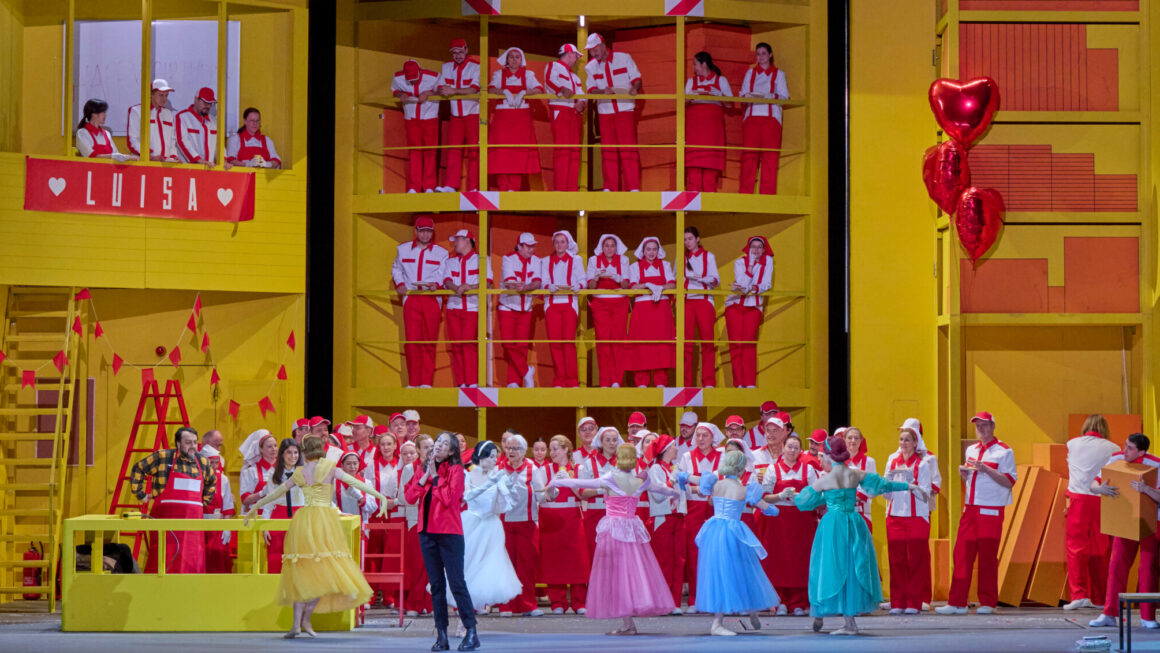The piece in question is rare enough to start this review with: “how can this story, one of Tchaikovsky’s masterpieces, be summed up?” It couldn’t be simpler: a widowed woman, Nastasya, better known as Kuma (a sort of cousin of Carmen) becomes the love object of a father, Prince Nikita Kurlyatev, and son, Prince Yury, whose wife/mother, Princess Yevpraksiya, seeks revenge with the help of a member of the Orthodox Church, Mamyrov. The origins of this story can be traced back to a theatre piece by Ippolit Shpazhinsky in the 1880s and, behind an apparently simple intrigue, is revealed an operatic work of unsuspected density.

Composed between Eugene Onegin and The Queen of Spades, The Enchantress returns to the Frankfurt Opera where it was first performed in 2022. Vasily Barkhatov’s staging and Valentin Uryupin’s musical direction are once again called upon to bring to life this opera. The transposition of the action from the 15th century to modern times is all the more successful thanks to Vasily Barkhatov’s sparing blend of elements from Western and Russian culture. The scenic elements and, even more so, the narrative discourse are thus accessible to everyone, without falling into triviality.

Overflowing, collective joy and the outpouring of the most varied feelings, reminiscent of friendship and companionship, take pride of place in the first act. In the second, the orchestration becomes more grave and subtle, heralding the climax of the drama. In the 3rd and 4th and acts, there is a haunting alternation between the purest lyricism, moments of the most miraculous abandon, and an ecstasy combining passion, hatred and jealousy until the (tragic) denouement of the drama. Thanks to a controlled impetus emanating from the pit, an inspiration richly decorated with nostalgia and sweetness, the musical result is imbued with great authenticity. Neither too much, nor too little: balance, accuracy – which does not annihilate a true character of direction. This reflects a thorough familiarity with Tchaikovsky’s rich score, as well as an undeniable affinity with a repertoire that Valentin Uryupin knows and has come to know at the Frankfurter Opern und Museumsorchester.
The cast is not exactly the same as in 2022, but we have no regrets about the new choices. We won’t have a chance to mention the individual work of the many singers who took part in this fabulous evening, but it’s worth highlighting their total commitment and their precious contribution to the success of this première.

After playing Polja in 2022, Nombulelo Yende takes on the title role: the South African soprano has outstripped the audience’s expectations. Her velvety, warm and enveloping voice is placed at the service of a character requiring extraordinary endurance. While hearing a lyric soprano embody this character may come as a surprise at the beginning, the result of her interpretation convinces us that this choice is more than justified: the enchantment of the voice is well and truly present. This challenge is met with disconcerting naturalness, while ensuring an admirable quality of articulation in Russian. It would be difficult to single out one moment in particular that was more moving than another, but his aria Glyanut s Nizhnego in the 1st act will remain one of the absolute highlights of the performance.
Alongside him, Iain MacNein’s Prince Nikita is a fundamental asset to the success of the soirée. The power and irresistible charm of this baritone, a connoisseur of the role, make for moments of great emotion. Even the excesses to which he is subjected (principally at the end of the opera) become, as far as possible, understandable in the logic of the character, which he is able to render with perfect credibility. An actor and an excellent lyric artist, to the delight of the audience.
And what can we say about Gerard Schneider’s Prince Yury? What a luxury to have a tenor capable of such dizzying prowess in a role where that’s all anyone wants! The influence of other repertoires, which he has mastered to perfection, is present to deliver a profoundly romantic vision of the role, but one that is in perfect harmony with the unfolding of the story and the musical evolution reserved by the score.
Elena Manistina captures the drama of a woman scorned by her husband and watching her son commit the same acts as his father, with a verve that verges on madness. A mezzo of unlimited power, capable of flooding the théâtre with the full range of her stainless voice, each of her appearances reminded us that we were indeed witnessing one of the most captivating – thanks to performances such as hers – Russian operatic dramas.
Mikhail Biryukov embodies a Mamyrov who is both obsessed with religious principles and… moody (at the 3rd and 4th acts). A bass with a very modulating voice, it is not cavernous like that of other compatriots sharing his vocal range, but capable of painting all the alienation specific to this role.
After such a beautiful evening, it is easy to understand that the witchcraft of which Nastasya is accused is not limited to her character: it is translated into music and performances of a very high caliber… for the enchantment of an audience hungry for emotion.
Casting: Nastasya/Kuma (Nombulelo Yende), Prince Nikita Kurlyatev (Iain MacNeil), Princess Yevpraksiya (Elena Manistina), Prince Yury (Gerard Schneider), Mamyrov/Kudma (Mikhail Biryukov), Nenila (Cláudia Ribas), Ivan Zhuran (Morgan-Andrew King), Foka (Dietrich Volle), Polya (Madina Abildina), Balakin (Jonathan Abernethy), Potap (Pilgoo Kang), Lukasch (Kudaibergen Abildin), Kichiga (Serhii Moskalchuk), Paisy (Michael McCown/Ilja Aksionov). Chor und Statisterie der Oper Frankfurt. Frankfurter Opern und Museumsorchester.





If some one wishes expert view on the topic of blogging and site-building afterward i recommend
him/her to go to see this webpage, Keep up the nice job.
Keep on writing, great job!